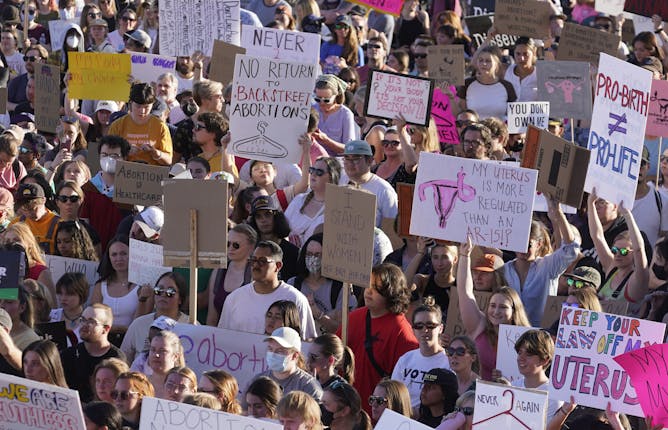|
The rise of corporate activism in the U.S. has been one of the big topics I’ve covered during my years at The Conversation. One of the first stories I edited on the topic bluntly asked, “When did Che Guevara become CEO?”
University of Michigan management professor and sociologist Jerry Davis was prompted to ponder that question in 2016 after Target waded further into the culture wars by saying it was going to build private bathrooms in all its locations in support of transgender customers. Since then, companies have threatened to back out of cities over so-called bathroom bills, stood behind Black Lives Matter and suspended donations to politicians over legislation limiting voter rights. And hundreds of corporations hightailed it out of Russia after it invaded Ukraine in February.
So why the timid response after the abrupt end of the constitutional right to abortion in America? Although roughly three dozen companies have issued statements since it became fairly clear the Supreme Court intended to overrule Roe v. Wade in early May, they've primarily lent support to workers who may need to cross state lines to get an abortion – not to criticize the ruling or back a bill that would restore the right.
Alessandro Piazza, who has examined the rise of corporate activism as well as the fraught issue of abortion rights in the U.S., explains why abortion may have been a lightning rod too far for today’s CEOs. Or in the language of the story I edited back in 2016, the Rice University scholar is basically suggesting CEO Guevara is losing his voice.
|

|
Bryan Keogh
Senior Editor, Economy + Business, The Conversation US
|
|

Alessandro Piazza, Rice University
In contrast to their reaction to gay rights or the war in Ukraine, relatively few companies have openly criticized the Supreme Court ruling ending a constitutional right to abortion.
|
|
|
|
|
Economy
|
-
Amitrajeet A. Batabyal, Rochester Institute of Technology
Economic growth of countries needs many ingredients. Getting the recipe just right is important.
-
Peter Martin, Crawford School of Public Policy, Australian National University
India is now the third-largest birthplace of Australian residents behind Australia and England, while for the first time less than half of the population has identified as Christian.
|
|
Philanthropy
|
-
Lucinda M. Finley, University at Buffalo
Even in states that ban abortion, legal precedents indicate that donating to, and receiving assistance from, abortion funds is an expression of free speech.
|
|
Technology
|
-
Nadia Smaili, Université du Québec à Montréal (UQAM); Audrey de Rancourt-Raymond, Université du Québec à Montréal (UQAM)
To combat the rise in deepfakes used in fraud, employees and investigators need to be aware of the threats involved.
|
|
Commodities
|
-
Corinna Hawkes, City, University of London
The global food system lacks resilience because it is too focused on keeping down costs.
|
|
More from The Conversation |
|---|
| |
|
| |
| |
| |
| |
|
|